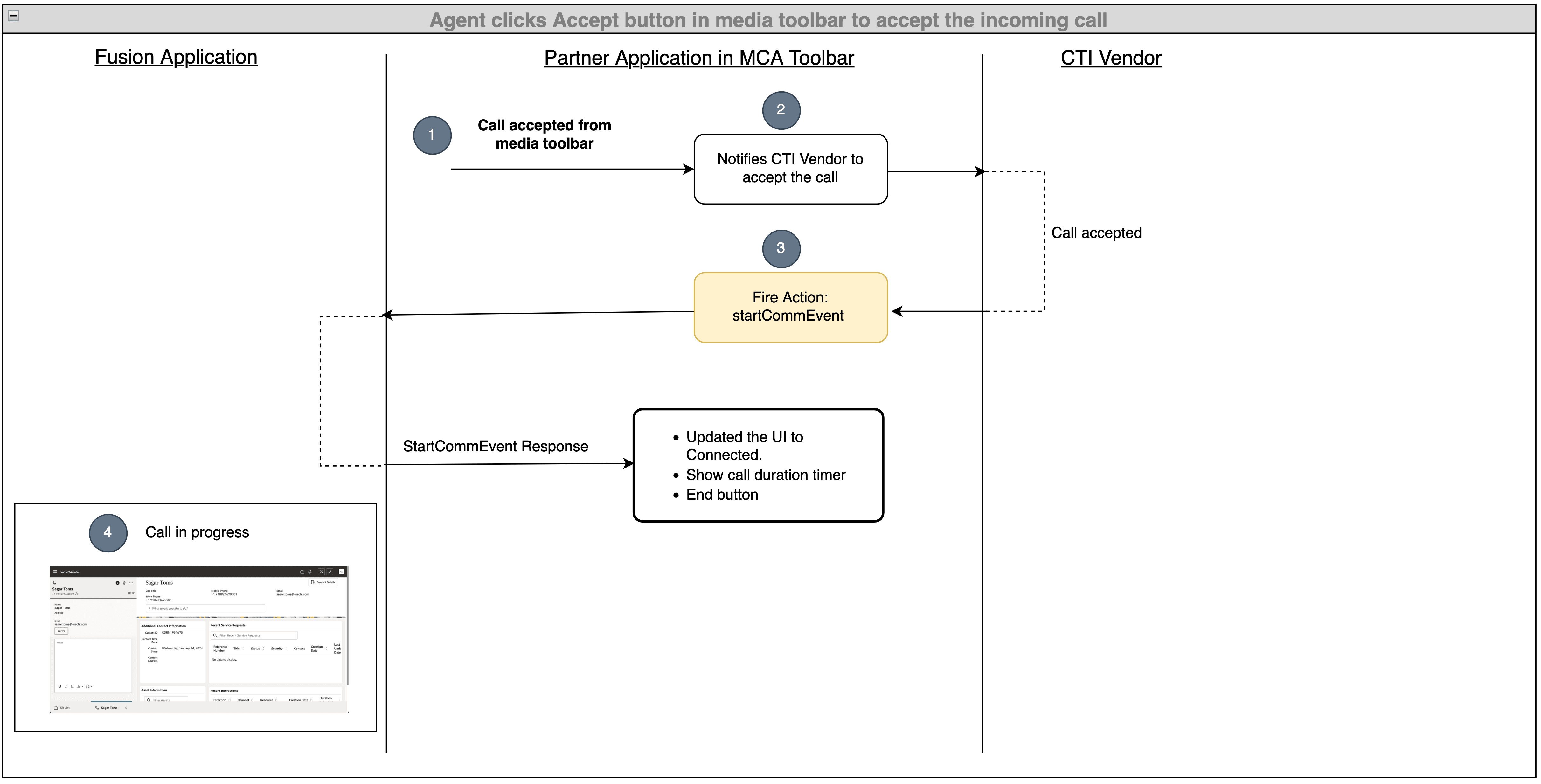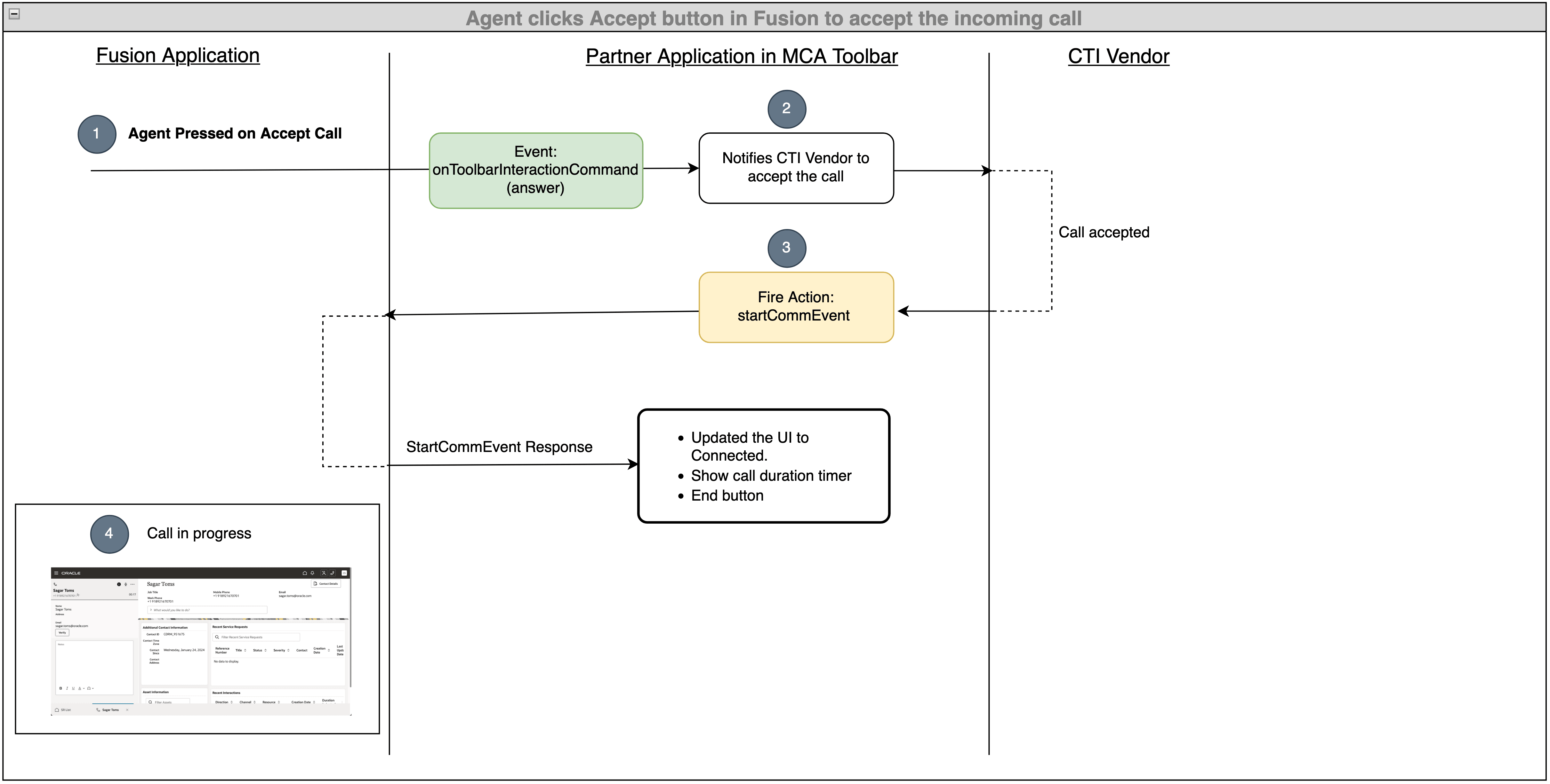Accept an incoming call from the Fusion application or toolbar application
Now that you've set up incoming call notifications in your media toolbar application and Fusion application, now you set up accepting them from the media toolbar application and your Fusion application.
You can screen pop the corresponding UI (Customer 360, Service request details,and so on) to help the Agent during the call. Once you do the setup the following setup tasks, you can accept the incoming calls.
Overview of the tasks
- Part 1: Accepting incoming calls from your media toolbar application
- Add an event handler for the Accept button click event.
- Define the
callAcceptedEventHandlerfunction. - Define the function
acceptIncomingCall in integrationActionHandler.tsfile. - Implement the
acceptCall()function in thevendorHandler.tsfile based on your CTI supplier's SDK. - Define the function
notifyCallAcceptedToFusion in fusionHandler.tsfile.
- Part 2: Accepting incoming calls from the Fusion application
- Add a method called
subscribeToToolbarInteractionCommandsFromFusionin theFusionHandlerclass and write the logic to subscribe toonToolbarInteractionCommandevent. - Call the function from the
makeAgentAvailablefunction in theintegrationEventsHandler.tsfile. - Define the function
listenToToolbarInteractionCommandsFromFusionin theintegrationEventsHandler.tsfile.
- Add a method called
Part 1: Accepting incoming calls from your media toolbar application
Once the agent clicks on the Accept button, the call-panel component fires an event notifying its container where the component is loaded. In our case, the component is loaded in the media toolbar application. An event is similarly fired when the Reject button is selected.
Also, a screen pop of the corresponding UI (Customer 360, Service request details, and so on) appears to help the agent during the call.
From the container, an event handler must be defined to handle these events.
The following diagram shows the sequence of actions to be performed when the agent accepts the call from the media toolbar application:

Here's the agent call flow:
- The agent clicks on the Answer button from the media toolbar application.
- The Partner application notifies the CTI supplier to accept the call by calling the supplier-specific APIs.
- Once the CTI supplier notifies the partner application that the call is
accepted, the partner application can fire the
startCommEventaction. - Once the Fusion application identifies this action, the matched contact and
an engagement panel is opened based on the rules configured in the Fusion
configuration management for the screen pop.
To configure the screen pop rules, see How do I configure screen pop pages?.
The following steps show you how to implement this in your toolbar application:
1. Add an event handler for the accept button click event
Add the Accept button clicked event handler in call-panel component as in the following example of the index.html file:
<oj-bind-if test="[[callContext().state === 'RINGING' || callContext().state === 'ACCEPTED']]">
<call-panel call-context="[[callContext]]"
on-accept-button-clicked="[[ callAcceptedEventHandler ]]"></call-panel>
</oj-bind-if>2. Define callAcceptedEventHandler function
Define the callAcceptedEventHandler function in the
appController.ts file as shown in the following example. The
callAcceptedEventHandler function internally calls two other
functions, acceptIncomingCall, which is defined in
integrationActionHandler, and
updateCallPanelState, which is defined in
appController.ts itself.
//.....
import "oj-c/button";
// ....
class RootViewModel {
// ....
constructor() {
// ....
};
public callAcceptedEventHandler: (event: any) => void = (event: any): void => {
this.integrationActionHandler.acceptIncomingCall(this.callContext().eventId).then(() => {
this.updateCallPanelState('ACCEPTED');
}).catch(() => {
console.log("Error: Unable to accept the call.")
});
}
//...
}
}3. Define the function acceptIncomingCall in integrationActionHandler.ts file
The acceptIncomingCall function contains the logic to notify your
CTI supplier to accept the call and also it contains the logic to notify the Fusion
application that the call is accepted by firing the startCommEvent
action.
import { IntegrationEventsHandler } from "./integrationEventsHandler";
import { ICtiVendorHandler } from "./vendor/ICtiVendorHandler";
import { VendorHandler } from "./vendor/vendorHandler";
import { FusionHandler } from "./fusion/fusionHandler";
export class IntegrationActionHandler {
private vendor: ICtiVendorHandler;
private integrationEventsHandler: IntegrationEventsHandler;
constructor(integrationEventsHandler: IntegrationEventsHandler) {
this.vendor = new VendorHandler();
this.integrationEventsHandler = integrationEventsHandler;
}
//....
public async acceptIncomingCall(eventId: string): Promise<IMcaStartCommEventOutData> {
await this.vendor.acceptCall();
const startCommResponseFromFusion: IMcaStartCommEventOutData = await FusionHandler.notifyCallAcceptedToFusion(eventId);
return startCommResponseFromFusion;
}
}4. Implement acceptCall() function in vendorHandler.ts file based on your CTI provider's SDK
See your CTI supplier's documentation to identify the API used to accept a call. You
can add the logic in the vendorHandler.ts file:
import { ICtiVendorHandler } from './ICtiVendorHandler';
export class VendorHandler implements ICtiVendorHandler {
// ....
public async acceptCall() {
// TODO: call the vendor specific api to accept a call
}
// ....
}5. Define function notifyCallAcceptedToFusion in fusionHandler.ts file
From the fusionHandler.ts, you notify the Fusion application that
the call is accepted by firing the startCommEvent action.
export class FusionHandler {
private static engagementContext: IEngagementContext;
// ....
public static async notifyCallAcceptedToFusion(eventId: string): Promise<IMcaStartCommEventOutData> {
let request: IMcaStartCommEventActionRequest = FusionHandler.frameworkProvider.requestHelper.createPublishRequest('startCommEvent') as IMcaStartCommEventActionRequest;
const newCommResponse: any = FusionHandler.callToNewCommResponseMap.get(eventId);
if (newCommResponse) {
for (const property in newCommResponse) {
request.getInData().setInDataValueByAttribute(property, newCommResponse[property]);
}
}
//TODO pass unique identifier from your CTI data
request.setEventId(eventId);
request.setAppClassification(FusionHandler.appClassification);
const operationResponse: IMcaStartComActionResponse = await FusionHandler.phoneContext.publish(request) as IMcaStartComActionResponse;
FusionHandler.engagementContext = operationResponse.getResponseData().getEngagementContext();
return operationResponse.getResponseData().getOutData();
}
// ...
}Part 2: Accepting incoming calls from the Fusion application
Now, when an agent clicks the Accept button from the Fusion call notification, you need to notify your media toolbar application and your CTI supplier that the call is accepted by the agent. You need to use the call accepted from the Fusion scenario to handle this. The following diagram shows the sequence of actions to be performed when an agent accepts the call from the Fusion application:

- When the agent clicks the Answer button in the Fusion application, the
onToolbarInteractionCommandevent is fired with the command as accept. - The partner application receives this event and if the event is to accept a call, the partner application notifies the CTI supplier to accept the call.
- Once the CTI supplier notifies the partner application that the call is
accepted, the partner application fires the
startCommEventaction. - Once the Fusion application identifies this action, the matched contact and
an engagement panel are opened based on the rules configured in the Fusion
configuration management for the screen pop.
To configure the screen pop rules, see How do I configure screen pop pages?.
1: Add a method subscribeToToolbarInteractionCommandsFromFusion in the FusionHandler class and write the logic to subscribe to the onToolbarInteractionCommand event
The agent's interactions, such as accepting, rejecting, and disconnecting phone calls
can be identified by subscribing to the onToolbarInteractionCommand
event through the UEF API. The event response consists of information about the
operations performed by the agent in the Fusion application window. Add a function
for the onToolbarInteractionCommand event in the
fusionHandler.ts file as shown in the following example:
export class FusionHandler {
// ....
public static subscribeToToolbarInteractionCommandsFromFusion(callback: Function): void {
const request: IMcaEventRequest = FusionHandler.frameworkProvider.requestHelper.createSubscriptionRequest('onToolbarInteractionCommand') as IMcaEventRequest;
FusionHandler.phoneContext.subscribe(request, (eventResponse: IEventResponse) => {
const eventResponseDetails: IMcaOnToolbarInteractionCommandDataResponse = (eventResponse as IMcaOnToolbarInteractionCommandEventResponse).getResponseData();
callback(eventResponseDetails.getCommand());
});
}
// ....
}When an event is received from the Fusion application window, it will execute a
callback function by passing the eventType to the callback
function.
2. Call the above function from makeAgentAvailable function in integrationEventsHandler.ts
The onToolbarInteractionCommand event subscription must be added
during the initial step when an agent is made available. So,
subscribeToToolbarInteractionCommandsFromFusion is called when
making an agent available. A callback function is also passed as an argument to the
subscribeToToolbarInteractionCommandsFromFusion function. The
callback function calls another function
listenToToolbarInteractionCommandsFromFusion which must be
defined in the interactionEventsHandler.ts file itself.
export class IntegrationEventsHandler {
// ....
public async makeAgentAvailable(): Promise<void> {
try {
await FusionHandler.makeAgentAvailable();
FusionHandler.subscribeToToolbarInteractionCommandsFromFusion((command: string) => { this.listenToToolbarInteractionCommandsFromFusion(command); });
this.ctiAppViewModel.agentState(true);
} catch (err) {
console.log("Error while making agent available", err)
}
}
// ....
}3. Define the function listenToToolbarInteractionCommandsFromFusion in integrationEventsHandler.ts
This function takes a command variable as a parameter. When a call is accepted, the
value passed for the command variable is accept. During this case,
callAcceptedEventHandler function is launched, which is defined
in appController and this will in turn call the acceptCall
function in your vendorHandler.ts file and call the
startCommEvent action and also updates the call-panel component
UI that a call is ACCEPTED.
export class IntegrationEventsHandler {
// ....
public listenToToolbarInteractionCommandsFromFusion(command: string): void {
switch (command) {
case "accept":
this.ctiAppViewModel.callAcceptedEventHandler(null);
break;
}
}
// ....
}Verify your progress
Once you complete the above steps, use the OJET serves to start your application and sign in to your Fusion application. Open the media toolbar and make your agent available for calls by clicking Agent Availability button. Start a call to your customer care number. You'll receive the incoming call notification in your media toolbar application and your Fusion application window. You can accept the call from your media toolbar application or your Fusion application. Once you accept the call, your media toolbar state will be changed to ACCEPTED state and the engagement will be opened in your Fusion application.